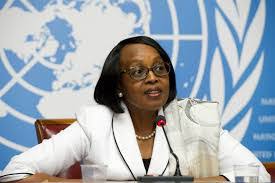By Blessing Bature
Ahead of the World Tuberculosis Day 2024, World Health Organization on Sunday urged all Member States to prioritize a multi-faceted approach that addresses the root causes of Tuberculosis disease while bolstering our efforts in prevention, diagnosis, and treatment.
In her message, WHO Regional Director for Africa, Dr Matshidiso Moeti also urge health leaders to intensify their commitment to strengthening health systems, ensuring equitable access to TB care, and scaling up innovative interventions.
Moeti said, Investing in research and developing new tools, including vaccines and improved diagnostics, is essential to accelerate progress.
She emphasized that countries must prioritize addressing the social determinants of TB, such as poverty, inequality, and limited access to healthcare, to achieve sustainable outcomes. Collaboration across sectors and borders is paramount.
She informed that WHO firmly commit to supporting all Member States and partners with unwavering determination for a world free of TB.
According to her, TB continues to be the second leading cause of death from a single infectious agent, surpassing the toll of HIV/AIDS. According to the latest report, about 2.5 million individuals contracted TB in 2022 in the region, equating to one person every 13 seconds.
“Additionally, the number of TB deaths in 2022 reached 424,000, resulting in the loss of one life every minute—even when TB is preventable and treatable. These figures underscore the urgency of our collective action in addressing the ongoing TB epidemic and highlight the need for sustained efforts to end it”.
“WHO African Region supports our member states’ fight against TB in Africa by setting strategic directions, developing monitoring tools, like the African TB scorecard with the African Union, and ensuring progress towards the End TB Strategy”.
She noted that WHO is dedicated to generating and sharing knowledge on effective TB control methods. We support countries by updating TB treatment guidelines to reflect the latest practices and expanding access to rapid diagnostic tools. Emphasizing the importance of regional cooperation, the WHO African Region encourages knowledge exchange and collaborative efforts across countries, significantly advancing the mission to eliminate TB as a public health threat in Africa.
“In the WHO African Region, we celebrate another milestone: diagnosing 70% of TB patients, marking a substantial reduction in missed cases and propelling us closer to our goal. This achievement is a testament to the relentless efforts of our Member States and partners, showcasing what can be accomplished through a shared vision and concerted action”.
“Between 2015 and 2022, our region achieved a remarkable 38% reduction in TB deaths, surpassing the initial End TB Strategy milestone of 35% by 2020. From 2015 to 2022, the region also saw a 23% reduction in new TB cases, exceeding the initial End TB Strategy target of 20% by 2020. All this underscores the effectiveness of implemented strategies and renewed commitment from countries”.
“However, while the reduction in TB deaths is commendable, it still falls short of the 2025 End TB Strategy target of a 75% reduction. Similarly, the 23% decline in TB incidence mises the mark of the 50% reduction target for 2025. This highlights the need for continued and intensified efforts to meet these ambitious goals”.
“Challenges such as delayed diagnosis, limited access to new tools and technologies, and the ongoing threat of multi-drug resistant TB require continued vigilance and sustained efforts”.
“Stakeholders can join us by providing resources, enhancing community engagement, conducting research, and forming private-sector partnerships. Through this unified action, we can address the challenges of TB in Africa and achieve our goal of its elimination as a public health threat”.







